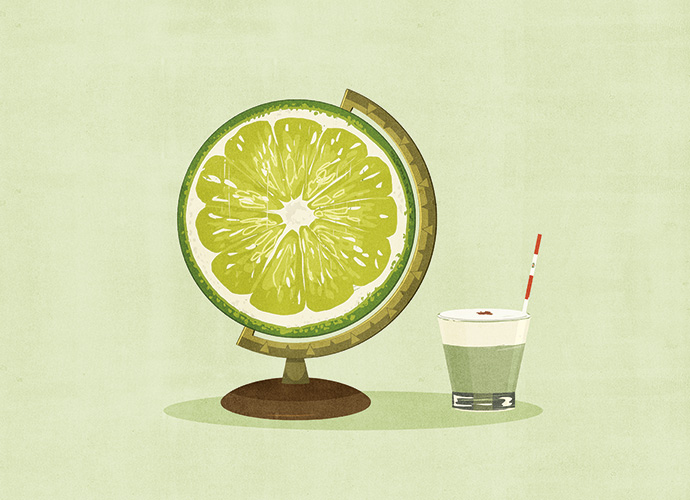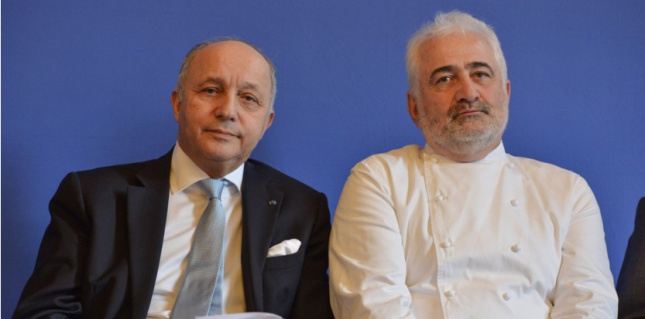I promised, and I’m delivering: enough waiting. Culinary Diplomacy and its first cousin / alter-ego Gastrodiplomacy are moving forward daily, and progress is inexorable. In my last post I alluded to many recent goings-on: my colleague Johanna Mendelson Forman is once again teaching at American University about Conflict Cuisines, and published an article introducing DC to its own conflict cuisine. Air Canada’s in-flight magazine “En Route” wrote a piece about Gastrodiplomacy, and concluded that “gastro-diplomacy has shifted the emphasis of traditional talks held over rubber-chicken dinners to a time when the food on the plate does the talking.” And there is more academic work being done: I’ve received emails from students around the world researching the field, and Communications Professor Dr. Juyan Zhang at UT San Antonio recently published a fascinating piece in the International Journal of Communication on Gastrodiplomacy campaigns, analyzing slogans, messages, and strategies to explain the current “global frenzy for gastrodiplomacy.”

Most notably, though, are recent statements from French Foreign Minister Laurent Fabius and other French officials on the occasion of the bequeathing of 2015’s Michelin stars. For the first time in history, the Michelin Guide was announced from the Quay d’Orsay, the home of France’s Ministry of Foreign Affairs, which, according to the New York Times‘ Florence Fabricant aimed to “underline the importance that the French government places on gastronomy’s role in tourism.” This is great news for those of us writing and thinking about the subject of culinary diplomacy, who have been working to prove that there is an indelible connection between food and diplomacy. It’s been difficult at times to convince non-believers that this isn’t frivolous (see the recent slap from Representative Trey Gowdy [R-SC] to State Department spokesman Joel Rubin during a Benghazi hearing: “If you have time for … culinary diplomacy, you have time to comply with us.” He was, of course, referring to State’s Diplomatic Culinary Partnership, launched in 2012). To have a high profile official like Fabius welcome France’s highest profile chefs into the Quay d’Orsay is undeniable proof that Culinary Diplomacy exists.

The problem is, though, that the scourge of unchecked patriotism (of which many countries, certainly including France, are guilty) led to the unfortunate conclusion from Fabius and others that France invented Gastrodiplomacy. France invented it! In October of last year, Le Figaro reported that M. Fabius stated that «Nous allons créer une nouvelle spécialité: la gastrono-diplomatie» (“We will create a new specialty: Gastrodiplomacy (or Culinary Diplomacy).” On February 2 of this year, the Michelin awards ceremony occurred at the Quai d’Orsay, with Fabius presenting alongside such culinary luminaries as Alain Ducasse, Guy Savoy, and Guy Martin. Fabius stated that “gastronomy is an extraordinary ambassador for developing tourism and foreign trade.” French diplomat Philippe Faure announced France’s gastrodiplomacy battle plan, «de diffuser la qualité française jusqu’à la dernière baraque à frites» — to disseminate French quality all the way to the last French fry food stall. (Are they now claiming frites over the Belgians?) And French magazine L’Obs announced that «le locataire du Quai-d’Orsay a inventé un nouveau concept : la ‘gastrodiplomatie’» — Fabius had invented a new concept, gastrodiplomacy.

Invented! If you’ve been following this blog, or the field, for the past couple of years, you’ll no doubt be aware of culinary diplomacy campaigns in Thailand, South Korea, Peru, Taiwan, and the United States. And you may be aware of the historical significance of sacrifice, feasting, and commensality, which I’ve written about elsewhere. Even Hillary Clinton acknowledges that “Food is the oldest diplomatic tool.” So no, M. Fabius, the French did not invent culinary diplomacy.
I won’t deny that the French have connected food and diplomacy for centuries, though. My own entrée into this field was sparked by learning of the chef Marie-Antoine Carême, the “King of Cooks and the Cook of Kings,” who helped maintain the world order with his gastronomic feats at the 1814 Congress of Vienna (I’ve written at more length about Carême and the Congress of Vienna in my 2013 article “Breaking Bread to Win Hearts and Minds.”) France’s cuisine is recognized by UNESCO as “intangible cultural heritage.” And France’s history as a destination for culinary tourism has meant that food has taken a central place in the country’s nation-branding campaigns.
What I do take issue with, though, is the gastronationalism, or perhaps gastrojingoism, at play here. It’s wonderful that the French government at the highest level is starting to capitalize on France’s status as an international culinary destination, the birthplace of haute cuisine and the training grounds for many of the world’s best chefs. The culinary hubris of Laurent Fabius, though, is beyond.
Maybe the French are on the defensive and trying to front a bit. In the New York Times Magazine in March of 2014, Michael Steinberger wrote an article entitled “Can Anyone Save French Food?” in which he states that “France’s culinary tradition has been withering for decades” and that “Paris has come to be regarded as a dull, predictable food city.” Mark Bittman followed up with a scathing op-ed in July of that year, entitled “French Food Goes Down.” He reports a 33% success rate with eating out in Paris: “Today, when I write about Parisian restaurants I have to eat in three to recommend one, and that’s with expert guidance.” I guess this raised M. Fabius’s hackles, and he must have concluded: If anyone can save French food, c’est moi. As he stated at the Michelin ceremony, “You will always find me at your side in defending and promoting what you all represent so well: French gastronomy.”
So, Monsieur Fabius: defend and promote French gastronomy. Put it on a pedestal and celebrate it. Follow America’s lead by naming Ducasse, Savoy, and Martin French ‘Culinary Ambassadors’ and start a chef corps to promote French cuisine worldwide. Follow Thailand’s lead by putting a stamp of approval on “worthy” French restaurants worldwide. Follow Spain’s lead and open university programs studying French gastronomy, or Peru’s lead and promote the use of native ingredients in global fusions. Just don’t claim that you invented all of this.
I will leave you with two quotes: the first from from my globe- and gastro-trotting colleague Paul Rockower:
“I am going to have to take France to The Hague for Crimes against Gastrodiplomacy. ICJ, here I come.”
And now, Winston Churchull, during the Second World War:
“Remember, gentlemen, it’s not just France we are fighting for, it’s champagne!”
One Response
The Power of the WFP’s VoucherChef Project | Culinary Diplomacy
[…] of the field’s name), some cheesy (“cultural” diplomacy), some historical (ideas around culinary nationalism and culinary imperialism). I want to write a bit about the work of the World Food Programme, an […]